T1D Guide
T1D Strong News
Personal Stories
Resources
T1D Misdiagnosis
T1D Early Detection
Research/Clinical Trials
A Conversation on T1D Screening with TCOYD’s Dr. Steven Edelman
Type 1 diabetes screening is gaining momentum due to advances in research, emerging treatments, and growing public awareness, especially around the fact that the disease can now be detected in its earliest, symptom-free stages.T1D Strong discussed early detection developments with Dr. Steven V. Edelman, Founder and Director of Taking Control Of Your Diabetes (TCOYD) and why everyone stands to gain.

T1D Screening
Screening for type 1 diabetes (T1D) hasn’t always been accessible, even for at-risk families. However, with growing advocacy efforts, support networks and practical screening methods, it’s becoming a more viable option in healthcare.
One reason for the increased awareness is that incident rates for T1D are rising among children, adolescents, and adults. If current trends continue, the CDC projects a 65% increase in T1D by 2060. Notably, 90% of new T1D cases occur in people with no family history.
T1D Strong was honored to pick Dr. Edelman’s brain on the topic of T1D screening. As the founder of Taking Control of Your Diabetes (TCOYD) and a practicing endocrinologist who has lived with T1D for over five decades, Dr. Edelman brought his medical expertise and a unique perspective from his lived experience.
About TCOYD
Dr. Edelman founded the nonprofit organization TCOYD in 1995 to educate and empower people with all types of diabetes. In addition to his role at TCOYD, Edelman is a Professor of Medicine in the Division of Endocrinology, Diabetes & Metabolism at the University of California, San Diego (UCSD) and the Veterans Affairs (VA) Healthcare System of San Diego. He also directs the Diabetes Care Clinic at the VA Medical Center.

He has authored over 200 articles and five books on diabetes, that include: Taking Control of Your Diabetes (5th Edition), 50 Secrets of the Longest Living People with Diabetes, and The Secrets of Living and Loving with Diabetes: Three Experts Answer Questions You’ve Always Wanted to Ask.
Q & A with Dr. Edelman
In our conversation, Dr. Edelman emphasized the benefits of early screening for T1D, particularly in light of recent medical advancements that can delay the onset in at-risk individuals.
T1D Strong: Why do you think screening guidelines are not implemented for type 1 diabetes, even for first-degree relatives?
Dr. Edelman: “Screening for a condition that most people haven’t heard of or that runs in their family is virtually impossible. We do know now that even people with celiac disease, Graves’ disease and Hashimoto’s disease also have a higher risk for type 1 diabetes, even if there is no family history. There are so many people with these thyroid conditions that it would make it impractical and almost impossible to screen.”
“It’s also difficult to screen first-degree relatives of people with type 1 diabetes because, as a doctor, we have to ask our patients to pass our message on to their families,” Edelman added. “We, as endocrinologists and diabetes specialists, don’t have direct access to family members, so we have to ask our patients to ask their relatives to screen. Typically, this topic doesn’t even come up during a clinic visit because there’s often not enough time to discuss it, or it only gets mentioned very briefly, and it’s difficult to make an impact in such a short period of time."
T1D Strong: T1D test kits can be expensive, and most doctors aren’t familiar with which tests to order. What is the simplest way for someone to be tested?
Dr. Edelman: “If you have a first-degree relative with diabetes, the simplest way to get tested is to order a free home kit through TrialNet. If you don’t have a first-degree relative with diabetes, you can still order a home test kit, though it may be an out-of-pocket cost.”
“You can also go through your primary care doctor. Ask them to order a type 1 diabetes panel. They have them at Quest and LabCorp, and also on Epic, which is a very common electronic medical records system. It’s important to know the four different autoantibodies to test for are:
- Insulin autoantibody (IAA)
- Glutamic Acid Decarboxylase Antibody (GADA)
- Tyrosine Phosphatase IA-2 Antibody (IA-2A)
- Zinc Transporter 8 Antibody (ZnT8)
If you have health insurance, your doctor can order these tests. It’s often called the type 1 diabetes screening panel, but there are different names for it. Just make sure it’s testing for the above four autoantibodies.”
T1D Strong: If a person tests positive for the autoantibodies, what steps should they follow?
Dr. Edelman: “If a person has a positive test, the next step would be to confirm the results with a second test. If they remain positive with two or more autoantibodies, they would then get a modified glucose tolerance test. All of this can be set up through an endocrinologist or TrialNet. (If someone has a positive test result, they can connect with TrialNet.)”
“If someone has two or more positive autoantibodies, they would be a candidate for a medication called Tzield (teplizumab), which can delay the onset of clinical diabetes. If there is only one positive autoantibody, the recommendation is to screen every year. Many endocrinologists (including myself) like to have patients wear a CGM (continuous glucose monitor) for one or two weeks in order to get a sense of any glucose abnormalities.”
Beyond the research and treatment advantages, Dr. Edelman spoke about the emotional benefits of early detection.
T1D Strong: The psychological impact of learning you have a chronic autoimmune disease like T1D can feel daunting. What advice would you give parents of young children and individuals to help them move beyond their fears and still test?
Dr. Edelman: “That’s a difficult question because everyone has different fears and perceptions, but I try to point out the positive side of knowing. The positive side is that you can now do everything you can to be prepared for diabetes, such as getting a CGM, having your whole family learn good eating and exercise habits, and finding an endocrinologist who’s experienced in diabetes so you don’t have to go looking for one later. Last but not least, you have time to learn the signs and symptoms of type 1 diabetes so you’ll know when it’s coming.”
“This way, you can avoid an emergency room visit or hospitalization for diabetic ketoacidosis. You’ll be able to avoid a traumatic entrance into the world of diabetes. Regarding advice to parents specifically, if I could introduce them to other parents who chose to screen, maybe that would help allay some of their fears.”
T1D Strong: If someone feels they would rather not know, how would you persuade them that knowing allows them to prepare emotionally, logistically, and financially for the lifestyle changes they could face?
Dr. Edelman: “I would suggest a visit to a clinical psychologist who is knowledgeable about screening and diabetes.”
T1D Strong: Please discuss the research and trial opportunities in which people in the early stages can delay the disease’s progression, which is crucial for future treatments or a potential cure.
Dr. Edelman: “More and more companies are developing pharmaceutical agents to delay or prevent type 1 diabetes. The Breakthrough T1D website has a list of ongoing research studies along with any geographical requirements. Most of these studies are done at clinical research institutions. There are several ways we can study if these drugs can prevent or delay the onset of type 1 diabetes.”
“We already have one medication called Tzield (teplizumab), which is a monoclonal antibody and currently the only FDA-approved disease-modifying agent. It’s really the tip of the iceberg in addressing this immunologic disease that we never have been able to alter in the past.”
Listen here to Dr. Edelman’s podcast with one of the first patients to receive Tzield:
A Groundbreaking Therapy with Tzield Featuring Sierra Werling
T1D Strong: What do you think the future of diabetes care will look like?
Dr. Edelman: “I think the future of diabetes care is going to be extremely effective, completely closed-loop systems where people with diabetes won’t have to announce a meal or count carbs. They’ll put on a system that monitors their glucose, controls insulin, and perhaps controls glucagon delivery as well, and they can go about their normal life without thinking as much about their condition.”
He added, “And I feel that this is not too far into the future. Once islet cell transplantation is approved - ideally without the need for immunosuppressants – that would be the ultimate cure. I believe that will be in our lifetimes.”
More on Taking Control Of Your Diabetes (TCOYD)
Podcasts and Community
Peer support rests at the core of TCOYD, emphasizing ways to improve diabetes management by connecting with other T1Ds to share experiences. Dr. Edelman co-hosts the TCOYD Podcast with Dr. Jeremy Pettus, where the two interview experts in the field.
.jpg)
TCOYD Events & Resources
The website, TCOYD, offers accessible and engaging online resources (videos, webinars, articles and downloadable guides.
TCOYD Screening Articles
- Why More People Aren’t Screening for T1D
- Screening Guide
- Why Everyone Should Screen for T1D
- To Screen or Not to Screen for T1D
TCOYD Conferences
TCOYD hosts in-person and virtual events nationwide, covering topics such as diet, exercise and mental health strategies, insulin management, continuous glucose monitoring, and, most recently, T1D screening.
The ONE Conference
The ONE conference has been the go-to event for adults living with T1D for six years. This year’s conference will be held in San Diego, CA, on August 8-10. Check here for more details: ONE: The Ultimate Conference and Retreat for People with Type 1

Join Dr. Edelman and other distinguished T1D experts for interactive workshops, music, dancing and great food. Sign up today for the last call discounted rate here.
More Reasons to Screen for T1D
Getting screened is easier than ever. You can take an at-home test, ask your doctor to order a screening (which may be covered by insurance), or explore free research programs like TrialNet and the Autoimmunity Screening for Kids Program (ASK).
As T1D screening efforts continue to expand, stay tuned as T1D Strong explores what early screening means for the future of diabetes care. Knowing your risk could make all the difference.


.webp)





.webp)
.jpg)
.jpeg)
.jpg)
.jpg)
.jpg)
.jpg)



.jpg)
.jpg)

.jpg)

.jpg)



.jpg)
.jpg)
.jpg)
.jpg)

.jpg)
.jpg)


.jpg)
















.jpg)





.jpg)







.webp)


















.webp)


%20(1).png)
























.webp)








.webp)